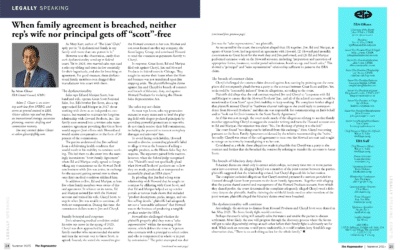The annals of Section 1983 litigation are filled with claims of constitutional rights violations by authorities due to plaintiffs’ race, religion or national origin. Far less litigation centers on state origin. As in police searching a car because it has out-of-state tags or because its driver hails from another state. Yet, this is what brought Peter Vasquez into court.
Vasquez, a Colorado resident, was moving to Maryland. While driving on Interstate 70 through Wabaunsee County, Kan., in December 2011, the temporary tag taped to the rear window of his 1992 BMW sedan was not visible to Kansas Highway Patrol Officers Richard Jimerson and Dax Lewis. They pulled him over.
When Jimerson approached the car, he noticed blankets and a pillow on the seats, and suspected they were obscuring drugs. He asked Vasquez where he was headed. “Elkton, Maryland,” Vasquez responded, where his daughter lived.
Jimerson proceeded to run Vasquez’s license and proof of insurance, and told Lewis that Vazquez seemed nervous. Lewis then checked on Vasquez and agreed he looked “scared to death.” From checking Vasquez’s proof of insurance, Jimerson discovered he also insured two newer cars, and the officers proceeded to summon a trained drug dog.
Upon learning Vasquez was moving to Maryland, Lewis asked him, “Where’s all the stuff if you’re moving?” Vasquez responded that most of his belongings were already moved. So Lewis issued Vasquez a warning and walked away.
Reconsidering, Lewis returned to pose more questions. Vasquez denied any drugs were in the car and refused permission to search his car. This led Lewis to suspect Vasquez of criminal activity and to detain him.
The police dog soon arrived, and Vasquez’s BMW was searched. Nothing illegal was found.
Vasquez responded by bringing an action pursuant to the Civil Rights Act, 42 U.S.C Section 1983, in Kansas federal court against Lewis and Jimerson. He alleged that by detaining him and searching his car without reasonable suspicion, they violated his Fourth Amendment right to be free of unreasonable searches and seizures.
Finding the officers enjoyed qualified immunity, the district court granted their motion for summary judgment. On appeal, Vasquez challenged only the use of the drug dog and the subsequent search.
Established precedent from the 10th U.S. Circuit Court of Appeals holds that once an officer determines a temporary tag is valid, the driver should be allowed to continue on his way. U.S. v. Edgerton, 438 F.3d 1043, 1051 (10th Cir. 2006). Therefore, the appeal focused on the officers’ assertion that factors other than the car’s temporary tag justified holding Vasquez and searching his car without his consent.
The factors they pointed to included Vasquez driving alone late at night, down the “known drug corridor” I-70 and that he was from Aurora, Colo., “a drug source area.” Hailing from Colorado was particularly suspect because it was “known to be home to medical marijuana dispensaries.”
Other factors furnishing reasonable suspicion that the officers identified included Vasquez’s nervousness, the presence of blankets in his car and the use of I-70, “a known drug corridor.”
The 10th Circuit found the suspicion not so reasonable. Firmly rejecting as “anachronistic” using Vasquez’s Colorado residency to justify the search, “in isolation or in tandem with other considerations,” this factor was deemed “so broad as to be indicative of almost nothing.”
The court noted that 25 states currently permit medical marijuana usage, while four plus the District of Columbia also permit some recreational use. Accordingly, the officers’ primary rationale for the search “would justify the search and seizure of the citizens of more than half of the states.”
The court decisively stated it’s “time to abandon the pretense that state citizenship is a permissible basis upon which to justify the detention and search of out-of-state motorists, and time to stop the practice of detention of motorists for nothing more than an out-of-state license plate.”
After the court deemed “impermissible” using state residency as a justification for reasonable suspicion, it briefly considered the officers’ factors other than the out-of-state tag. That Vasquez seemed nervous upon getting pulled over was hardly surprising, and “of limited significance in determining reasonable suspicion.”
The court also minimized any suspicion Jimerson found from the presence of blankets in the car, noting the “seemingly contradictory” suspicion Vasquez found in the car’s absence of contents. And merely traveling on an interstate cannot make “otherwise innocent conduct suspicious.” An equally viable conclusion could be reached that driving from Colorado to Maryland without taking I-70 was suspicious.
“What we have here,” the 10th Circuit summarized, “is a driver traveling from Colorado to Maryland, on a major interstate; in an older car despite owning a newer car; with blankets and a pillow obscuring items in the back seat; who did not have items visible that an officer expected to see; and who was and continued to be nervous when pulled over by officers late at night.”
This conduct was insufficient to furnish the police with even an “inference” of reasonable suspicion to justify a search.
Vasquez’s Fourth Amendment rights were therefore violated, a violation actionable in Section 1983 litigation.
Concluding the constitutional violation occurred served to meet the first of two showings necessary to overcome a qualified immunity assertion. The second, that at the time of the violation it was clearly established the challenged actions would violate those rights, was readily found in 10th Circuit precedent, including in another appeal involving Jimerson improperly searching an out-of-state motorist who appeared “extremely nervous.” (U.S. v. Wood, 106 F.3d 942, 944 (10th Cir. 1997)).
The appellate court reversed the trial court’s order granting Jimerson and Lewis summary judgment and remanded the case. Vasquez v. Lewis, No. 14-3278 (10th Cir., Aug. 23, 2016).
The enduring yet unremarkable principle to emerge is that it is “wholly improper to assume that an individual is more likely to be engaged in criminal conduct because of his state of residence.”



